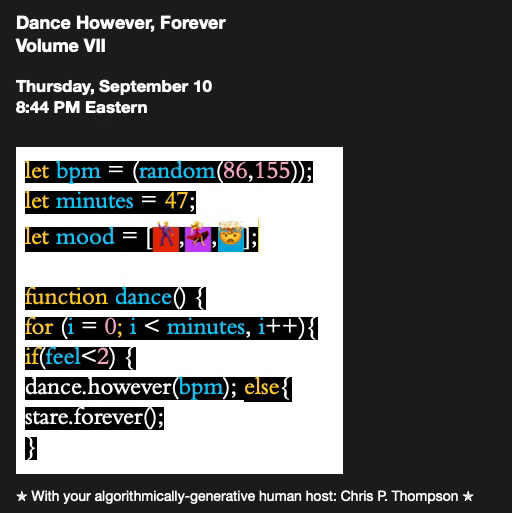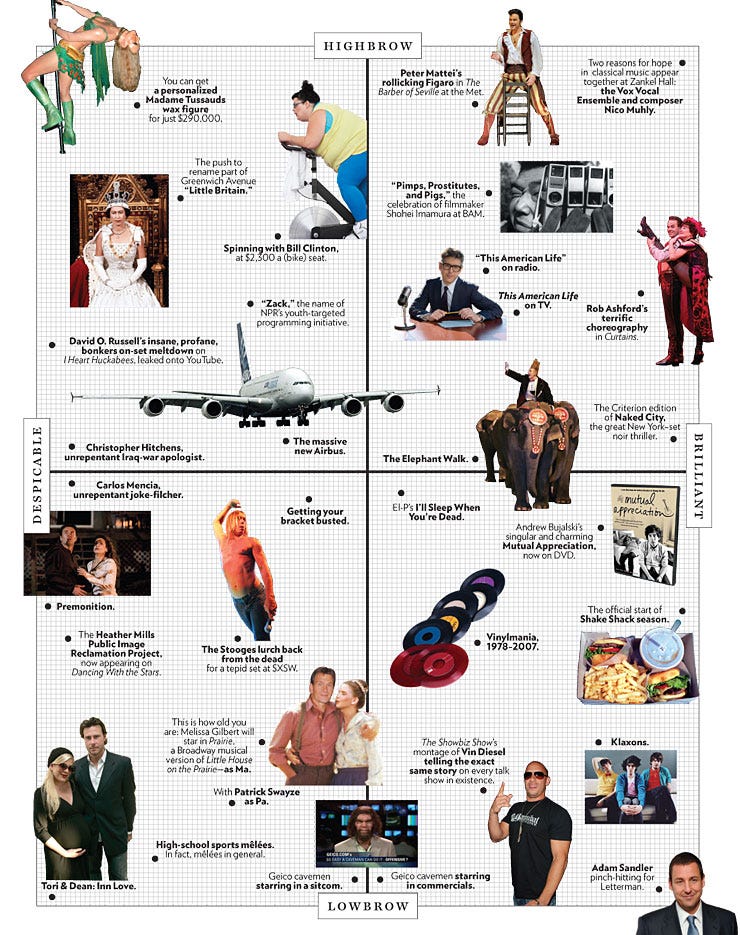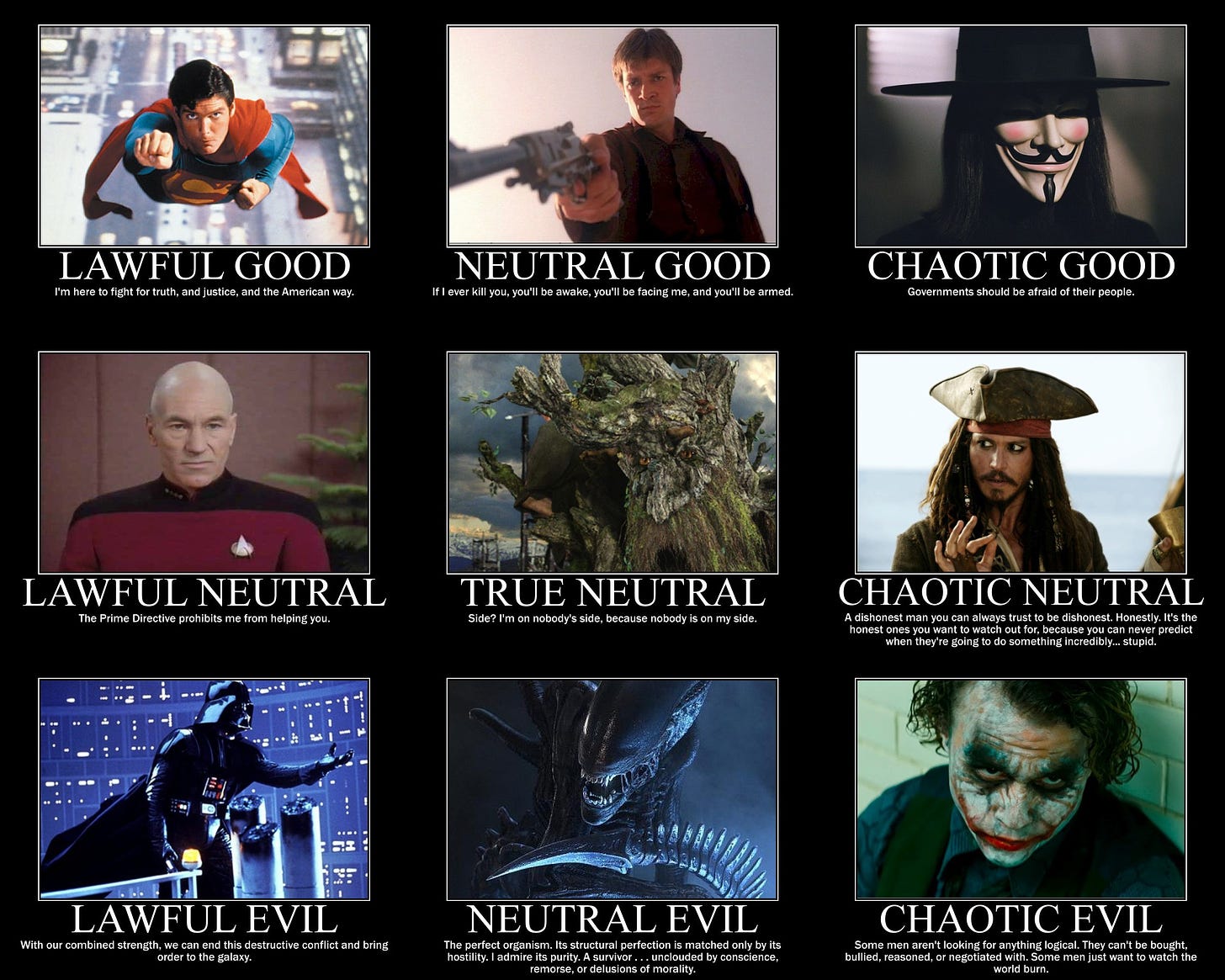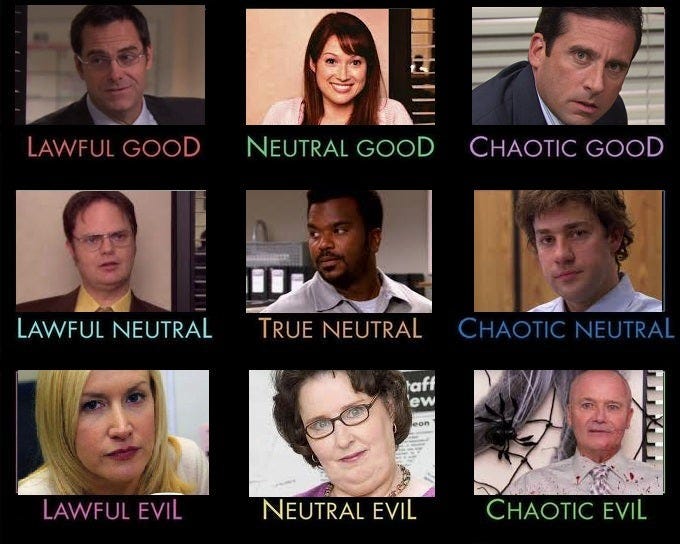Dance However, Forever
Confession: I hosted zoom dance parties in 2020. There, I said it.
"Chris. We all did."
I know, I know. But I like to think mine were special — I made elaborate interstitial video interludes synced between tracks. I had hand-drawn animated visuals. Each "volume" started at exactly 8:44 pm and was precisely 47 minutes long. I used metrically-modulating transitions! I created elaborate themes, a whole DJ persona, and email "flyer" concepts:
I would spend each week blissfully scouring bandcamp for new and interesting stuff to play. This really improved my curatorial skills, and I had possibly the most fruitful year of my life for personal music discovery. It was wonderful.
It's still kind of embarrassing though.
Turning briefly now to where musical curation goes to die… I'm canceling my Sp*tify subscription for good this month, yay! I know this doesn’t make me some kind of courageous visonary: nothing I could say about it hasn’t already been said a basquillion times by everyone. Suffice to say I’m just trying to focus on staying engaged with new music in the most supportive and ethical ways I can.
In order to create a fun bit of faux ceremonial closure (and encourage myself to follow through), this week I'm sharing two playlists I made on that platform that are very precious to me:
Dance However, Forever is 12 hours, 38 minutes of certified bangers, many very much quirky and unexpected, covering all eighteen volumes of those dance parties.1
The Aphex Index is eight separate playlists: 14 hours of Richard D. James aka Aphex Twin’s music — classified by brain hemisphere and dream flavor (more on this below).
I hope you find them enriching and rejuvenating! I also hope you'll consider purchasing any discoveries that you might want to listen to again: digitally, on vinyl, cd… cassette maybe?
Hey, I’m Chris. I write music, and play percussion in contemporary chamber-band Alarm Will Sound. My weekly newsletter Music and Math and Feelings explores a broad range of musical topics: from just intonation to electronic music to drum corps to performing artist mental health.
You can subscribe for free: new things arrive Sunday mornings.
You can also not subscribe, and still scroll down and watch my justly-tuned arrangement of Avril 14 with puffin mating dances.
The Coda
Back to Dance However, Forever. One very important part of each volume's meticulously-designed structure is the coda: attendees are invited to sit back and enjoy a closing piece of "classical music" until the 47 minute mark, when the mic drops and the zoom cuts off suddenly.
These tracks are typically "classical" only in the loosest and sometimes most ironic sense of the word. Example: for Volume XIV, I arranged an iconic work for solo piano by Richard D. James himself. The concept:
Avril 14 but it's just intonation, with puffin mating dances.
I was pleased with how this turned out:
Later that night, in the texts:
Phil: "Was that Kanye?"
Me: "That was Aphex Twin. Wait… did Kanye sample that?!"
Two worlds collide. Fun!
Phil told me he had always heard about Aphex Twin but didn't know a way in. Mixtape?
Curation
The challenge: Mr. Twin's output is so vast that his oeuvre can feel like the work of more than one artist. And not just multiple artists, but multiple artists who might not actually like each other.
Thus, mixtaping his music is a minefield… I’ve tried. If the goal is to draw a listener in and carry them through the whole mix, any one track could self-destruct that whole mission, depending on the listener.
Just one example: back when we used to listen to albums in their proper sequence, I often wondered how many of the people who would surely love Flim were able to make it through Come to Daddy [Pappy Mix] in order to get there.
Give it a shot:
There is a saying:
“if you’re writing for everyone, then you’re writing for no one.”
Well… each of these tracks are for someone. Are both for anyone?
Heavy Up / Heavy Down
(and other fun and bespoke classification schemes)
Sam2 came up with a great method for classifying the concert works in his personal repertoire — helping facilitate easier curation of concert programs. “Heavy Up / Heavy Down” (as we’ve come to call it) isn’t meant to be scientific or comprehensive! Rather, it’s a fun way to classify one particular collection.
Start with the predominant emotional weight:
Fun
Heavy
Next, tag the energy level:
Up
Down
Noticing a preponderance of works in one category (Fun Up), Sam split that in two:
Fun Up (Light)
Fun Up (Serious)
Let’s take a look at a recent Aphex-adjacent Alarm Will Sound program3 that juggled a whole bunch of short pieces:
Fun Up (Light): 2
Fun Up (Serious): 3
Fun Down: 0
Heavy Up: 3
Heavy Down: 2
Looks pretty balanced overall… but hey, no fun down?… perhaps a little Avril 14?
Approval and Alignment
Two other favorite bespoke classification schemes:
NYMag’s “approval matrix,” which plots cultural phenomena on a Cartesian coordinate system: level of elitism on the y-axis, and a judgement of quality on the x-axis. Interestingly, there doesn’t appear to be a dependent variable here.
The Alignments — originally invented to define a moral and ethical compass for player-characters in Dungeons & Dragons, it has proved fun and useful for classifying all sorts of different character universes.
The Aphex Index
So while Phil probably had something like an “intro to” mixtape in mind, I decided to go with a more completist strategy by creating a full bespoke classification scheme. This would allow the entry point to be chosen more intentionally.
All of RDJ’s music is “electronic.” This is probably its only characteristic that can be quantifiably demonstrated as universal throughout the catalog.4
In my opinion, all of RJD’s music is also “dream-like.” If I were to take that as a constant, I decided I could classify any track into one of four dream types:
Childhood Flashback
Lucid
Tangled Limbs
Nightmare Scenario
Each category can then be further divided by brain hemisphere, as I imagine they relate to artistic approaches to electronic music:
a. Right Brain (intuitive, emotional)
b. Left Brain (logical, organized)
The category most friendly to a general audience is, for sure, 1a. that’s where I file Avril 14, as well as favorites like Alberto Balsalm, Fingerbib, and #17 — simple, innocent, naive, and delightful.
Many Aphex superfans’ entry point is probably 3a or 2a (both of which fit naturally into two preexisting electronic music genre classifications that need not be spoken aloud).
Personally, I was first enthralled by 3b, specifically the mind-blowing, calculate-the-area-beneath-the-curve ride of Bucephalus Bouncing Ball — still one of my favorite pieces of music of all time in any genre.
With these playlists, I can now offer an entry point to this music with the greatest potential for a success, specific to who I’m sharing it with. From there, next steps can feel more like branching out slowly — and less like running into a monster.
Here’s that link again, to the complete set.
https://www.chrispthompson.com/the-aphex-index
Thanks so much for watching/listening. You can subscribe for free:
If you upgrade to a paid subscription I’ll mail you a vinyl record or compact disc of your choice from my catalog.
Credit to Aaron Roche who spearheaded the idea by matter-of-factly informing me one day “you’ll be DJing a zoom dance party tonight.” This is not the kind of thing I would ever have done on my own, and I’m glad I accepted the challenge. Aaron also came up with the name.
I highly recommend exploring Sam’s excellent work: specifically his solo performances commissioned for his original percussion setup concepts, and his book How to Write for PERCUSSION. www.szsolomon.com
This was a super fun program and might just be a preview of an upcoming album…
Jlin Black Origami - Fun Up Serious
Aphex Twin T69 Collapse - Heavy Up
Lucrecia Dalt Cabeza - Heavy Down
King Britt - The Intention - Fun Up Serious
Aphex Twin Blue Calx - Heavy Down
Sophie Faceshopping - Heavy Up
Matt Rogers Vole Sweeps Up! - Fun Up Light
Aphex Twin Minipops - Fun Up Serious
Tim Exile Family Galaxy - Heavy Up
Aphex Twin Four - Fun Up Light
Can anyone confirm this for certain? Even his piano instrumentals appear to be performed by a pre-programmed Disklavier, which makes them “electronic” in my eyes. Same with his prepared piano tracks? I’m not sure there is an example of any track in the RDJ catalog that is a live human performance of an acoustic instrument.








Nice. I enjoyed these reflections on classification and the importance of attempting to understand a complex opus. Congratulations also on leaving Spotify. They are the worst. I’d recommend checking out subvert.fm — building a cooperative model to preempt the enshittification of Bandcamp.